Federal State Budgetary Educational Institution of Higher Education vocational education"Perm State Humanitarian and Pedagogical University"
Master's student, 1st year
Ganshchuk Svetlana Vladimirovna Candidate of Biological Sciences, Associate Professor of the Department of Zoology
Annotation:
This article addresses common problems family education, and the reasons for their occurrence.
The author believes that upbringing in a family is a process of interaction between children and parents, as a result of which a certain level of development is formed. In order to achieve a positive result in raising a child in a family, the upbringing process must be conscious and analyzed.
The article reviews widespread problems of family education and their reasons. The author considers that family education is the process of parent-child cooperation, which leads to a formation of a definite evolutionary level. The process of family education should be thoroughly realized and analyzed in order to make positive educational results.
Keywords
Family; upbringing; child; personality.
Family; education; child; personality.
UDC 37.013.77 Introduction Education is the most important process that affects the development of a child. The process itself is a system that forms the unity of moral, labor, mental, aesthetic, physical education, in areas in which a person shapes himself in a comprehensive manner. When defining education, we rely on the opinion of N.K. Krupskaya and I.E. Schwartz, who interpret this concept in a narrow sense, as the deliberate and systematic influence of adults on the behavior of children and adolescents . By education in the broad sense of the word, N.K. Krupskaya understood the influence of the environment and conditions, situation, public institutions, social order, throughout life, meaning not only children, but also adults. Thus, in a narrow sense, this is the entire process of educating a person, and in a broad sense, it is the process of organized influence on children. It is worth noting that both the narrow and broad understanding of this concept are equally widespread.
Relevance.
On this moment, the study of problems of upbringing in the family is relevant, knowing possible reasons problems arise in education, it is possible to prevent and eliminate them.
Target This article covers the main problems of upbringing in a family and their impact on the child.
Tasks:
Explore thematic pedagogical literature, where the problems of education in the family are considered.
Conduct an analysis of this literature
Identify common, frequently occurring problems when raising a child in a family.
Scientific novelty. Common problems that arise when raising a child and their impact on him are identified.
IN modern science Educational problems are studied quite widely. Today we are faced with the following problems in the field of education: the formation of culture interethnic communication, interethnic tolerance, the problem of family education and some others. In our opinion, the problem of family education comes to the fore. The institution of family plays a huge role in the development of a child. It is in the family that the child receives his first social experience and is formed as a personality. Moreover, the institution of family bears moral and legal responsibility for the personality of the person being raised, his behavior and actions.
In his works, A.V. Mudrik points out that the knowledge gained in the family and the skills of interaction with family members in the future will be used in the new “own” family that has already been built.
Family and family education are two complex mechanisms that include a number of problems necessary to solve.
The first problem of family education is that parents only care about the physical condition of the child.
It has been proven that with this approach the harmonious development of the child suffers. First of all, with the arrival of a baby in the family, parents should introduce an algorithm for raising a child, read additional literature, listen to the recommendations of specialists, in this case educators, spend most of the time with the child, establishing live communication, and teach the child how to interact with the world.
At birth, a child has only a complex of physiological and psychological characteristics, under the influence of environment and upbringing they are transformed into personal qualities, needs, abilities, character traits.
The task of parents is to endow the child with spiritual and moral values, help him realize his capabilities, creative, sports and intellectual potential.
The second problem is the inability of parents to choose a style and tone of communication that will help establish contact between parents and the child, and in the future, the child with society.
Sometimes parents do not control their speech and communicate rudely with their children, or speak to their children in their own language and use obscene language. This model of communication is learned by the child, instilled in it and implemented in life. A child can use this interaction system when communicating with friends, with teachers at school, in public places oh, and in the future with my children. Thus, family education should instill in the child and reinforce a certain kind of norms of behavior and communication: with friends, with adults, with older people, etc. After all, it is family education that solves problems aimed at the comprehensive development of the child. From the first days of his existence, a child enters into communication with his parents, getting to know his parents, the child gets to know himself and society, is enriched with various information, copies emotional attitude to the world, thoughts, gestures, actions.
The third problem of family education is the formation of an incorrect lifestyle for the child.
Sometimes parents lead a passive social or unhealthy lifestyle. Parents' lifestyle, their interests and exciting questions, everyday life, things surrounding the child are most often copied by him. In a family where parents regularly read books, exchange opinions about what they read, and take an active part in various events and promotions, children will show interest in books, newspapers, and take part in class and school events. If the family shows care and emotional responsiveness to the sadness and joy of other people, then the child will also develop the skill of understanding the world of emotions and experiences, first of the parents and then of other people, and to enjoy the fact that his sensitivity and responsiveness evoke positive emotions in others .
The fourth problem is unfavorable climate in family.
A. S. Makarenko noted: “The main foundation for the formation of a growing personality, ensuring high coefficient in the family is an educational climate.” It is formed by such components as: relationships between family members, communication, personal example of parents, family traditions.
Family atmosphere is the family’s lifestyle, its value system, its social attitudes, relationships with other people, the ability to tactfully build relationships in the family.
Relationships between parents form the pedagogical atmosphere, and the culture of relations between spouses is a main part of the family climate. Human dignity can only be affirmed in an atmosphere of family harmony.
There is often a phenomenon when children are in no hurry to go home, preferring to be on the street or in the company of friends. This problem arises precisely because children do not feel a favorable family climate, warmth, love and joy in the family.
The child feels useless in the family, he begins to study poorly, displays aggression and negative emotions when communicating with his parents, and bad habits appear.
The fifth problem is the lack of a friendly attitude towards the child, the lack of interest on the part of parents in his mood and moral state. Lack of affection, care, and prolonged emotional isolation cause the child to become withdrawn.
Parents who do not express positive emotions and a friendly, friendly attitude towards their children contribute to unbalanced, impulsive behavior, the formation of fears and complexes in the child.
The sixth problem is overprotection.
Today we often encounter such a phenomenon in families as overprotection. Overprotection is excessive care for the child and total control, as a result of which the independence of the individual is limited. This parental behavior creates in the child mental disorders , self-doubt, failure. In the future, an overprotected child will not be able to make his own choices or make decisions on his own. This model of upbringing gives rise to weakness and immaturity in a future member of society. Another possible scenario due to overprotection is the child leaving the family. As soon as the child senses such an opportunity, he will take advantage of it. He can simply run away, or quickly get married, and deliberately enroll in a university in another city, or simply go to another city in search of better fate
. In such cases, it happens that the child subsequently almost completely stops communicating with his parents. One way or another, it is difficult for children who grew up in a family with overprotection. It’s hard for them to believe in themselves, make a career, or start a family. All their lives they have to overcome the complex of inferiority and failure, which was driven into their heads by “loving” parents.Conclusion. Thus, upbringing in a family is a process of interaction between children and parents, as a result of which a certain level is formed: intellectual, physical, value-oriented development. The family can act as both a positive and negative factor in education. In order for the result of raising a child in a family to be positive, the upbringing process must be conscious and analyzed. It is important that theoretical basis that parents teach their child were supported by examples; theory should not diverge from practice. An integral part of upbringing in a family is constant psychological contact parents with child. The main task of parents is to create conditions in which the child could discover and develop himself. Form a mature and interesting personality a child is possible if you help him in opening: innate skills, inclinations and talents. It is these hidden abilities, transformed in the future into hobbies, interests and preferences, that will make up the personality of your son or daughter and emphasize its originality. Individuality and uniqueness. In addition, the child should be given freedom, respect his own opinion, learn to trust him, and also teach him to take responsibility for his actions. Only when such conditions are created can we count on mutual understanding between each other and on open, honest, respectable, partnership relations.
Bibliography:
1. Irzhanova A. A..ru/stat.php?i=1417961299 (date of access 10.10.16)
2. Konstantinov, N.A., Medynsky, E.N., Pedagogical theory N.K. Krupskaya / History of pedagogy / A. N. Konstantinov, E. N. Medynsky, M. F. Shabaeva. M.: Education, 1982
3. Kulik L.A. Family education: Tutorial/ L.A. Kulik - M.: Education 2003. 175 p.
4. Makarenko A.S. Book for parents: [Lectures on raising children] / [Compiled. and author. will enter. article by K.I. Belyaev]. – M.: Education, 1969.–359 p.
5. Makarenko A.S. About education in the family: Izb. ped. works / [Enter. article by E. Medynsky and I. Petrukhin]. – M.: Uch.ped.iz, 1955.- 320 p.
6. Mudrik A.V. Social pedagogy: Textbook. for students ped. universities / Ed. V.A. Slastenina. - 3rd ed., rev. and additional – M.: Publishing Center “Academy”, 2000. - 200 p.
7. Spitsyn N.P., Pechersky M.S., Charny B.M. Family: thousands of problems of education / Spitsyn N.P., Pechersky M.S., Charny B.M. Family: thousands of problems of education - Perm: Book Publishing house, 1988.-186 p.
8. Kharchev A. G. Modern family and its problems (Socio-demographic study) / A. G. Kharchev, M. S. Matskovsky. - Moscow: Statistics, 1978. - 223 p.
Reviews:
28.11.2016, 17:29 Trubavina Irina Nikolaevna
Review: the article is not scientific, unfortunately... family education is not stated to be relevant, the identification of its problems is subjective, general, relating to all families, which is not correct and objective... the title does not correspond to the content - the problems of family education from different historical periods, judging by the literature. specify - modern problems family education or in the era of Makarenko, or the 80s of the last century? family develops as family problems and relationships..on what basis are the problems of family education identified? what are they caused by? upbringing in the family and upbringing are identified, the features of the family are not highlighted. Tasks 1 and 2 are identical, the conclusions do not correspond to the tasks.. it is not recommended for publication until the comments are corrected.
28.11.2016, 22:44 Slipchishin Lidiya Vasilievna
Review: Notes. 1. The article is unscientific and superficial. There is no scientific novelty. 2. The topic of family education has always been relevant, and now even more so. But the relevance of the article is not substantiated, the contradictions are not highlighted, and there is no time frame for the problem. 3. Analysis of bibliographic references shows that the author primarily used textbooks and manuals that were slightly outdated to highlight modern problems, which reduces scientific level articles. All this affects the content of the article. In this form, the article is not recommended for publication.
11/30/2016, 7:36 Franchuk Tatyana Iosifovna
Review: The work lacks systematicity, scientific character, and consistency of the author’s positions. For example, the introduction presents a definition of the essence of education from the position of the classical (N. Krupskaya) subject-object formula of the relationship between participants in the process, that is, “as the deliberate and systematic influence of adults on the behavior of children and adolescents.” In conclusion: “family education is a process of interaction between children and parents.” This is a fundamental contradiction. The classic formula (as a one-sided effect) is yesterday. Modern - education as an interactive activity (interaction), is integrally interpreted as the basis of a personality-oriented, competence-based educational system regardless of type and level. The article requires significant revision.
12/6/2016, 16:04 Belykh Alexander Sergeevich
Review: The article is not scientific. The abundance of semantic, stylistic errors and commonplaces that do not need proof allows us to conclude that the material is not ready for publication.
7.12.2016, 13:10 Pleshchev Vladimir Vasilievich
Review: The article is more of an abstract nature, even to some extent a literary review. But not scientific at all. There are mistakes. The novelty has not been revealed. The article needs improvement.
“I didn’t have children, but there were 6 theories of raising them.
Now I have 6 children - and not a single theory..."
Problems of family education can become global problems of the society in which we live. If we raise our children poorly or even try to shift the care of them onto the shoulders of others, we are building with our own hands a future in which we will be surrounded, perhaps, by successful and business people, but indifferent people. It is not enough to give birth to a child - he needs to be raised so that he can take a worthy place in society and feel happy. The role of parents in raising children is very important - development depends on them life scenario growing baby.
Teachers and educators complain that parents have completely ceased to be interested in raising their children. Parents read specialized literature, master the methods of Doman, Montessori, Nikitin and Zaitsev, with early years send the child to English, ballroom dancing and in the sports section, they invite a speech therapist to the house. The key words here are “give” and “invite,” and this is one of the main problems of family education.
Parents try with all their might to shift the upbringing of their own offspring onto the shoulders of others, completely forgetting that family upbringing lays the foundation of personality. And this is precisely the area where you cannot completely trust specialists; you need to invest your own soul.
Since ancient times, certain traditions and laws of raising children in the family have developed. The father's role in raising children was to make vital decisions to ensure the well-being and lifestyle of the child. The father had the power to punish and pardon - the father, as a rule, was the final authority in making important decisions in the life of the family.
Financial responsibility for the family also lay on the shoulders of the father - he had to provide for his wife and children, as well as instill adaptation skills to adult life an already grown-up child. This was especially true when raising a boy. Somewhere until the age of seven, the son was in the care of his mother, and after that he came under the authority of his father - he taught him and passed on his knowledge. The son was also supposed to adopt his father’s attitude to life, to become his “copy” - this is what was considered in society to be “the correct upbringing of a child.”
The mother's role in raising children was somewhat different. The mother was traditionally considered the protector of the child - this was due maternal instinct, expressed motherly love, constant thoughts and prayers for the children.
On the shoulders of the mother lay the care of the baby and direct upbringing, including the moral qualities accepted in society. This was especially true for girls - it was the mother who was responsible for the moral character of her daughter, and also had to help her master traditional women's activities and prepare a decent dowry.
Today, hundreds of different parenting methods are offered to parents - from the Japanese “king, slave, friend” scheme to methods aimed at developing genius in a child literally from the first days of life. But despite this, every parent faces a huge number of questions, the answers to which determine the fate of the child.
How to ensure optimal conditions for raising children in a family if the family is not complete? What is the role of father and mother in raising the younger generation? How to improve relationships with your son or daughter?
One of the main laws underlying the upbringing of a child is ensuring his safety, both physical and psychological. Every child is born with qualities and character traits already given by nature that require development. A sense of security is a necessary condition for the development of a child’s innate properties. Otherwise, child theft, running away from home, drug addiction, prostitution - the roots of all these problems are hidden in family education, built without taking into account the mental characteristics of the child.
Family education allows a child to gain first knowledge about the world in which he will live, an idea of what is good and what is bad, and how to act in a given situation. Thanks to upbringing in a family, the baby receives initial skills in communication and interaction in a team, even if this team is limited to three family members. By the way, this is why it is important for a child to have brothers and sisters. Children from large families are more adapted to life in society; such family education can be given the title of “school of life.”
One of positive features family education is the child’s communication with representatives of different age categories. He learns to build relationships with people not only of different character types, but also of different ages. Growing up in a large family prepares a person for life, creating a miniature model of society.
Children are the most dependent and most defenseless members of the family. You should not ask whether parents love their children, whether they wish them well, health and happiness. Of course they love and desire. But then why do parents so often take out their irritation, their impatience, their troubles on them, their loved ones, their adored ones? To give your life for a child - yes, at any moment! Is it more difficult not to shout at him without choosing words, for example in the morning because the baby did not get up right away? Don't spank angrily for a lost mitten? It’s absolutely impossible not to sort out your relationship with your husband, wife, mother-in-law or mother-in-law, neighbors, or anyone else in the presence of your son or daughter!? But who said that educating a person, an individual, is an easy task?
Everything that a child sees and hears in childhood, in the family, especially in the family, is deposited in his soul firmly and for a long time, often forever. This is a truism that should be remembered as often as possible. Therefore, we will give a quote that is very well-known, but perhaps forgotten by someone.
From a letter from Anton Pavlovich Chekhov to his brother Alexander, written at the end of 1880:
“Children are holy and pure. Even among robbers and crocodiles they are in the rank of angels. We ourselves can climb into any hole we want, but they must be enveloped in an atmosphere suitable for their rank. You cannot with impunity... make them the toy of your mood: either gently kiss them, or madly stamp your feet on them. It is better not to love than to love with despotic love.”
“... Despotism and lies have distorted our childhood to such an extent that it is sickening and scary to remember. Remember the horror and disgust we felt at the time when our father rebelled at dinner because of too salty soup or cursed our mother as a fool. Now my father just can’t forgive himself for all this.”
We will try to behave with children in such a way that our conscience does not torment us later.
We are all people, we are all “humans”, and life for most of us is not easy, and there are any number of problems. Moreover, nerves, well-being, relationships at work, in transport, on the street... everything affects your mood. But in addition to reason, a person must also have “brakes” in order to restrain himself, to control his nerves, his mood. Mentally to a normal person This is quite possible. And if someone moans: “Oh, I have nerves, that’s why I say too much!” - ask him if he says “unnecessary things” to his superiors, or to the person he wants to impress good impression, or simply to someone whose opinion he values.
Each family has its own characteristics, techniques and traditions of family education. It is impossible to give universal advice to everyone, everyone, without taking into account the age and quantitative composition and social level. However, some general rules exist. They are simple and banal, but, like many obvious concepts, they are sometimes forgotten by us.
Family upbringing presupposes an atmosphere of love, happiness, warmth and goodwill.
Parents accept the child as he is, try to develop his abilities, all the best that is in him.
Family education takes into account the characteristics (age, gender, personality) of the child and is built on the basis of these characteristics.
Raising children in a family is based on mutual respect, from which high demands arise.
Problems in family upbringing are often rooted not in the child, but in the personality of the parents, whose behavior model the children unknowingly copy.
Family upbringing is based on the positive things that exist in little man. You can't focus solely on the shortcomings. This approach is wrong and leads to the development of complexes.
In family education, it is enough to simply follow the following principle, which experts in child psychology insist on: any training, any activities aimed at the development of a child should be built in the form of a game.
The general tone of upbringing in the family should be positive and optimistic.
There are also disadvantages of family upbringing that can play a negative role in a person’s life. Such negative features of family education should be given special attention, since it is they that force some teachers to talk about the advisability of the boarding school system, that is universal education away from the family. Let's name the most common negative factors in raising children in a family.
Material factors can be considered the most influential in prosperous families. Family education, both in more affluent families and in families with little income, is often based on cultivating the idea of the predominance of material values over spiritual ones.
The value of family education falls if parents are not only unspiritual people, but are also determined to aggressively oppose development spiritual origin in a child.
Two sides of the same coin - impunity and authoritarianism - also do not benefit the upbringing of children in the family. The child develops a false picture of the world, which provokes subsequent inappropriate behavior and the development of hidden complexes.
It is completely unacceptable to be brought up in a family in an atmosphere of immorality, to instill in a child immoral ideas about human behavior.
A difficult psychological climate in the family is, unfortunately, such a common phenomenon that this factor is not even considered necessary to mention. However, growing up in dysfunctional families in an atmosphere of scandals, assault, and quarrels between parents has an extremely negative impact on the child and can become a source of subsequent psychological problems.
Often, upbringing in a seemingly prosperous family does not bring the fruits that it should bring. This happens if parents are confident in their psychological and pedagogical doctrine (usually outdated or erroneous), using psychological pressure, physical punishment, causing children not only physical, but also mental suffering.
Fortunately, today there are services psychological assistance and legal services where a child can turn if their health, sanity or life is in danger.
However, despite all the pitfalls, the family remains the most important condition proper development children. The trend that has emerged in families cannot but rejoice. Parents, especially young ones, perceive and analyze information about the upbringing and methods of child development, apply the acquired knowledge in practice and try to pay more attention to their children than they themselves received in childhood. Remember that knowledge, ideas about the world, habits established by the family will remain with a person for life and will largely become the determining conditions for his behavior and successful life.
The future of any society depends on the younger generation. It is children who will determine what will be valued and condemned in it, which traditions will be preserved and which will be forgotten. That is why modern problems of family education of a child concern not only his parents, but the entire society as a whole.
Modern parents have ample opportunities for the comprehensive and competent development of a child with any interests and needs. They can assign him to any studio or club, hire a specialist who is ready to teach the child speech, solve his development problems, drive away fear, become more friendly and sociable... The list of services provided to children can be continued endlessly. But with all this, parental education has undoubtedly played an important, key role in the process of education at all times.
Family values are the basis for raising a full-fledged personality
Deprived of support and care from those closest to him, a child, even if surrounded by many highly qualified specialists, will not be able to accept and truly deeply assimilate the rules of upbringing.
Principles of family education
What are the features of family education, the consideration of which is mandatory for any family interested in raising a worthy person?
The first and, perhaps, main condition for successful family education is absolute and unconditional love for the child.

The parental home is destined to become a territory in a child’s life where he will not only feel protected and safe, but count on understanding and care, no matter what happens. Moreover, it is very important that the child understands that he is loved regardless of his successes and personal achievements. And they accept him for who he really is.
Despite the fact that at first glance this condition of upbringing may seem naive and obvious, it carries an important meaning. A child who understands that the measure of parental love depends on how well he studies, how he pleases loved ones with sports and other achievements, grows up unsure of himself and anxious.
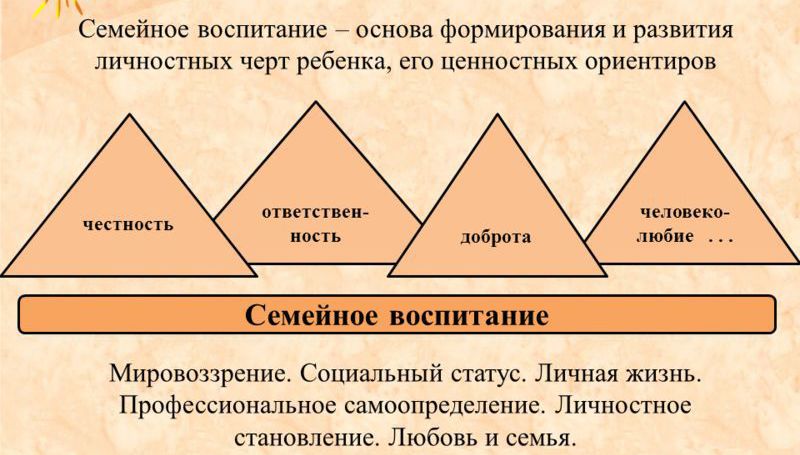
Tasks and goals of family education
If it is not possible to attract attention to oneself through good deeds, the child chooses a fundamentally different strategy. And he begins to be stubborn and misbehave, demonstrating negativity that seems unreasonable at first glance. Parents most often do not understand the reasons for such behavior of the child, attributing everything to a lack of upbringing and most often “load” him even more, thereby alienating him from themselves and provoking even more inappropriate behavioral reactions. It turns out to be a vicious circle.
Understanding and acceptance of the feelings and emotions that a child experiences, a willingness to demonstrate the most lively and direct participation in the child’s life - this is what should become the basis of family education.
Contrary to popular belief, unconditional love cannot spoil a child or spoil him. By allowing the child to feel protected and confident, it opens up many paths for self-development.
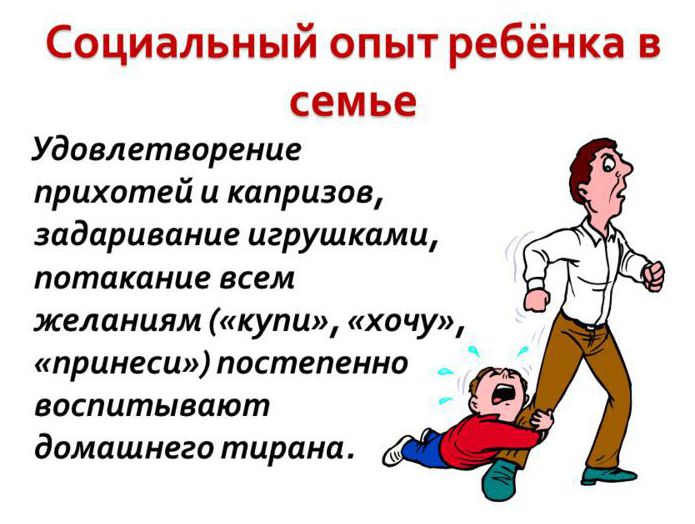
Indulging in whims - raising a future egoist and tyrant
Of course, unconditional love should not be confused with indulging the slightest whims of a child. The line separating what is permitted from what is forbidden in the family must be both clear to fully form in the child’s mind the idea of what is forbidden and what is permitted, and flexible enough to adapt to the changing needs of the child. But, most parents, trusting their intuition and knowing their child, as a rule, are themselves able to understand what kind of freedom they need at one stage or another. And exactly loving parents They know like no one else how important it is to prepare a child for reasonable self-discipline, self-development, and work on oneself.
The child’s assimilation of ideas about environment, the formation of a picture of the world is another, no less important task of family education.
He learns in an unobtrusive manner about the rules that apply in the society in which he lives. And over time, he begins to understand how best to behave in a given situation, and what not to do. Family education teaches a child the simplest skills of interacting with the people around him. Later, he will transfer his habits and use the acquired skills by playing with peers, and then by communicating with neighbors, teachers, etc.

Family is a place of communication between representatives of different generations
When discussing the role of the family in the development of communication skills, it should be noted that, among other things, it allows the child to interact with representatives of different age categories.
Over time, he begins to understand that he needs to communicate with representatives of the older generation in a completely different way than with peers. And that there are separate rules of etiquette governing interactions with boys and girls, men and women, etc. The family becomes a “smaller copy” of the society in which he will live.
Families at risk and their characteristics
When considering modern problems of family education, one cannot ignore the problem of dysfunctional families and families at risk. Of course, every family is interested in ensuring that the child raised in it is surrounded by care, attention and does not need anything. However, a number of economic, demographic, health and other factors lead to the fact that the family finds itself in predicament and turns out to be unable to provide the child with a full upbringing and development. Such “at-risk” families need additional help. And often, due to deepening problems, they are unable to fulfill parental responsibilities properly.
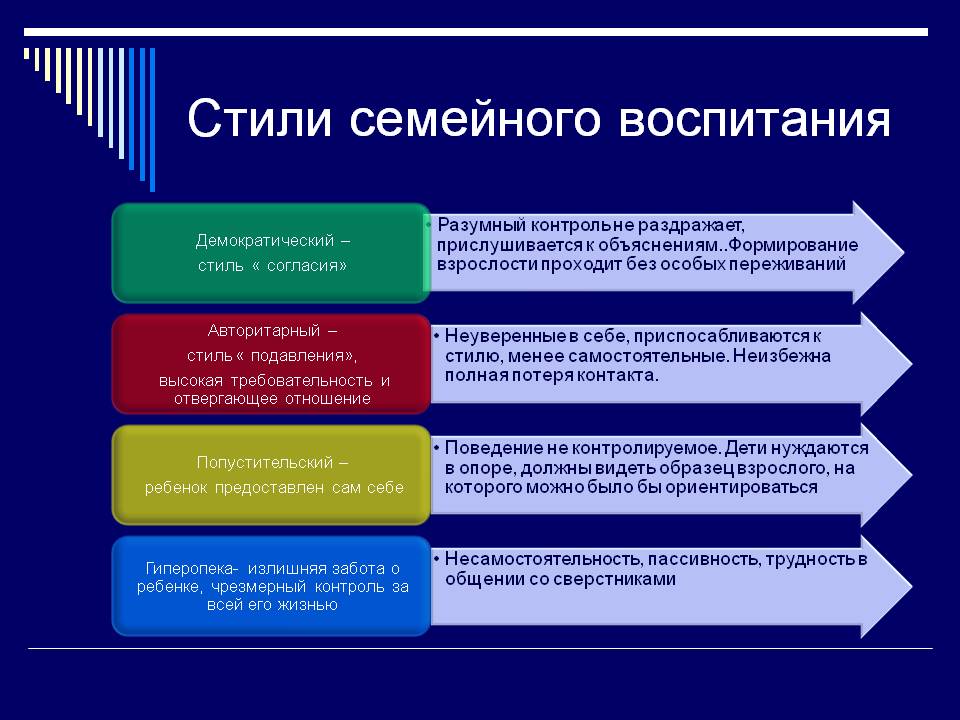
Family parenting styles and their characteristics
What threatens the increase in the effect of unfavorable factors?
First of all, let us note the frightening trends: trouble threatens an increase in the number of neglected and street children, families without permanent place residence, as well as low-income families, etc.
Frightening statistics showing a constant increase in the number of cases of deprivation and restriction of parental rights and registration of families indicates that the problem of family dysfunction requires an immediate solution.
Let's look at the main types of dysfunctional families that exist today.
Single-parent families
Families where a child lives with one of the parents are considered incomplete. The problems of such families most often become:
Socio-economic problems. These include limited income and low material security. Most often inherent in such children, since in most cases they have a limited source of income. In addition, forced to combine work with childcare, a woman who remains the only caregiver most often cannot find a full-time job. working rate, which prevents obtaining a full wages. And child benefits, alimony, and other social payments most often cannot cover even part of the expenses for children.
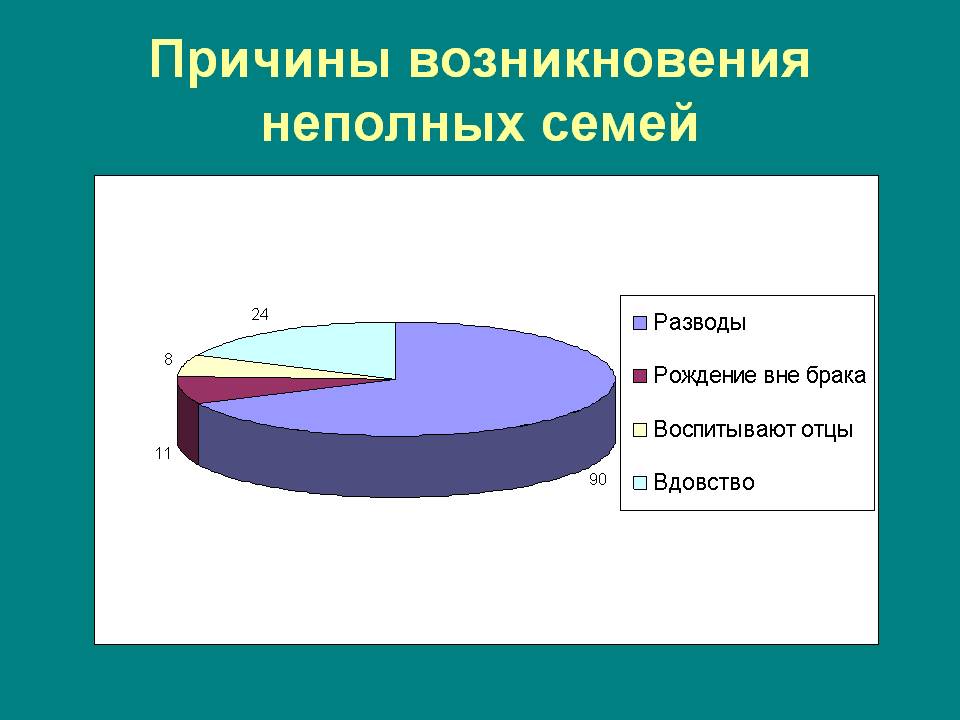
Reasons for the emergence of single-parent families in Russia
Behavioral problems. The absence of one of the parents most often changes the style of family education in a negative way. For example, trying to protect the child as much as possible from the stress associated with going through a divorce, as well as changes that have affected the family’s lifestyle, many mothers begin to overprotect their children, depriving them of independence. And some go to the other extreme, depriving children of parental care and attention, loading themselves with work. Another example of an unhealthy relationship in the “child-parent” system can be the mother’s desire to be excessively strict, thereby wanting to “compensate” for the absence of a father. In all these cases, the atmosphere in the family where the child is being raised becomes extremely unhealthy.
Often after a divorce, a mother cannot cope with the negative emotions associated with ex-husband. And he begins to take out his anger on his child.
The natural result of the negative styles of family education that have developed is the breakdown of parent-child relationships, tendencies towards mutual distrust, disruption of communication ties and many problems that the child will face in the future.
Psychological problems. These include, first of all, experiences associated with the lack of moral support from one of the parents. In families where a child has experienced a divorce from his parents, he develops many complexes - this includes experiencing separation from one of the parents and blaming himself for what happened. In addition, the absence of one of the parents can have an extremely negative impact on the child’s self-esteem.
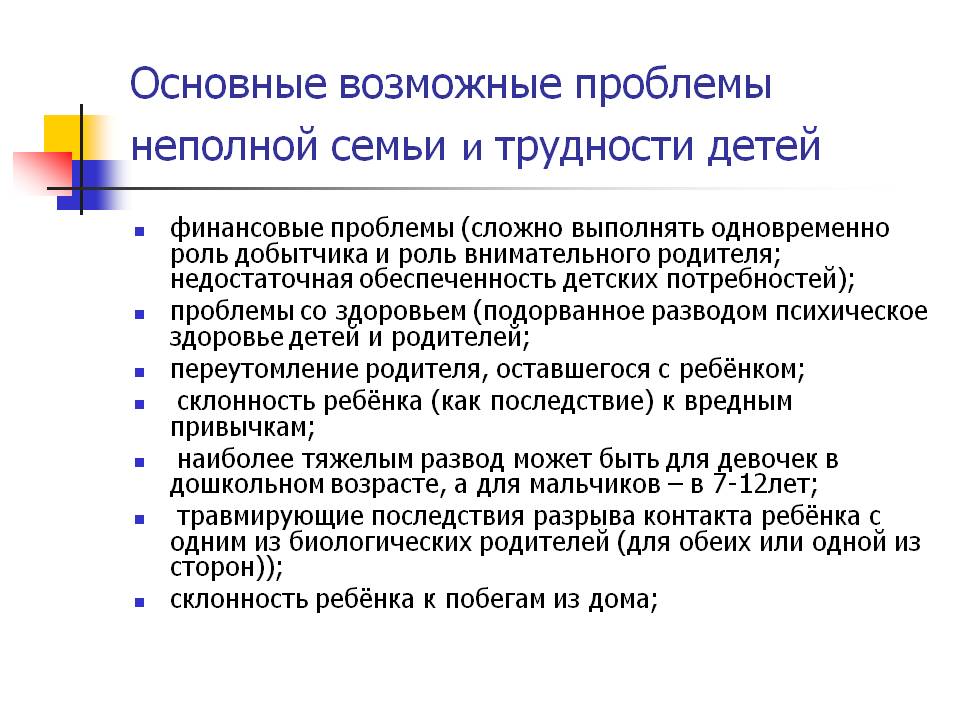
The main problems of single-parent families
A separate problem of family education in single-parent families is the child’s assimilation of gender-role behavior patterns. As is known, gender models, that is, behavior patterns, characteristic of representatives a child learns about one gender or another, first of all, by looking at his parents. Growing up in a family, the child begins to gradually notice, first the obvious external, then behavioral differences between men and women, and also relate himself to one of these models. An incomplete family significantly limits the child's ability to do this. And if, for example, a boy grows up without a father, in the future it will be more difficult for him to demonstrate forms of masculine behavior in many situations.
Many parents seek to solve this problem by entering into remarriages. However, establishing relationships with a new family member also requires considerable effort on the part of the child’s loved ones.
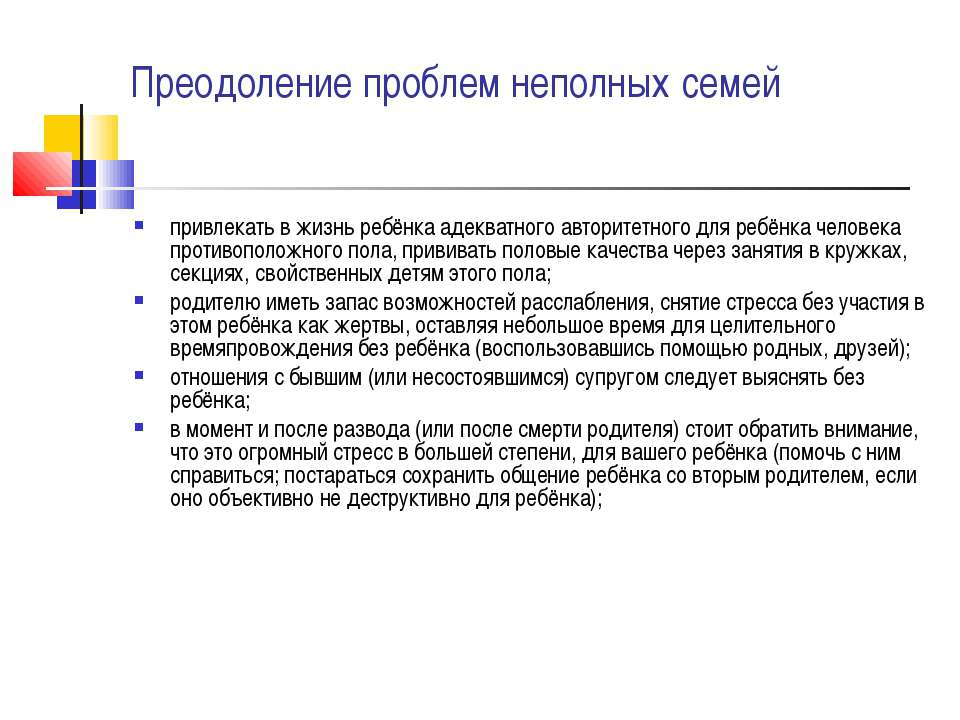
Ways to solve problems of single-parent families
An extended single-parent family is a separate category of single-parent families. If in an ordinary single-parent family a child is raised by his mother or, less often, by his father, then in an extended family, grandparents act as guardians. In such a family, in addition to socio-economic ones, a number of specific difficulties arise. Grandparents, due to the large age difference with their children, often experience difficulties in building constructive relationships with them, and it is difficult for them to earn their authority. Children of such guardians are more likely than others to demonstrate forms of delinquent and deviant behavior.

Types of deviant behavior of children from single-parent families
Large families. Despite the fact that at the beginning of the twentieth century the presence of eight or more children in a family was considered practically the norm, today the situation has changed radically. And despite the fact that growing up in a large family greatly facilitates the socialization of a child, developing in him communication skills and interaction with peers, and also instills responsibility in him, they still belong to families at risk.
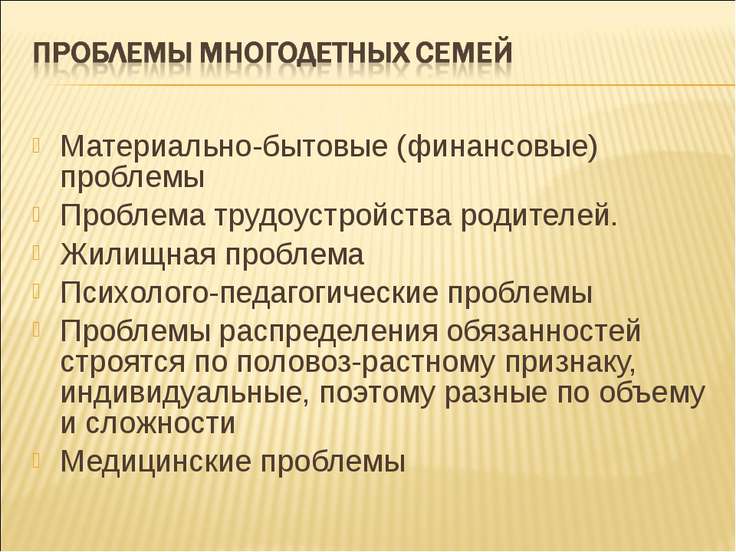
The main problems of large families
Large families can be planned or unplanned. Also, depending on some features, they are divided into the following categories:
- Families whose large number of children is associated with culturally determined factors (for example, in cases where the religion professed by the parents categorically prohibits abortion, or traditions, as well as personal beliefs of family members encourage large families.) Such parents may experience many difficulties associated with raising and providing for children, however, children in them are always desired, planned, and parents have the desire to give birth to them and raise them in the future.
- Large families due to the creation of remarriages. Often, a man and woman who enter into an agreement to live together already have children of their own, born in previous marriages. In most cases, such a decision is made responsibly with an understanding of what the potential spouses are doing. But most often they are quite prosperous, except in cases where the parents were unable to improve relations between relatives.
- Large families due to the low sociocultural level of parents. This is the most difficult category of large families, since parents, due to their reduced cultural development, bad habits, antisocial image life do not realize the amount of responsibility that is assigned to them in connection with parenthood. And a child born in such a family most often does not have necessary conditions For full development. And therefore it needs serious rehabilitation measures.
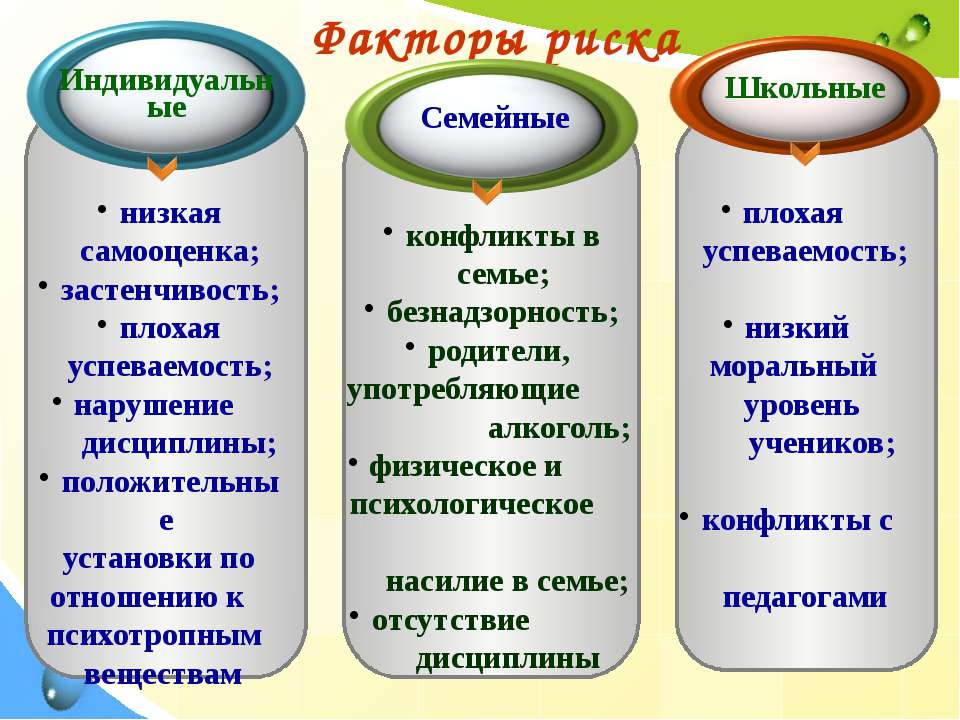
Risk factors for children from large families
The problems of children raised in large families are usually similar:
- Due to a lack of parental attention, children most often develop inadequately low self-esteem.
- Due to the fact that in large families, part of the care for the younger ones falls on the older ones, the social age of the former increases, while the social age of the latter becomes noticeably lower.
- The shorter the interval between the births of children, the stronger will be their competition for parental resources.
- Tendencies towards negative perceptions social institutions(especially families).
Family raising a child with disabilities health. Socialization of people with disabilities today is significantly difficult. A disabled person needs constant care, his income is significantly limited, and his adaptive capabilities are reduced. All this affects not only the financial situation of a family where there is a person with disabilities, but also its psychological climate.
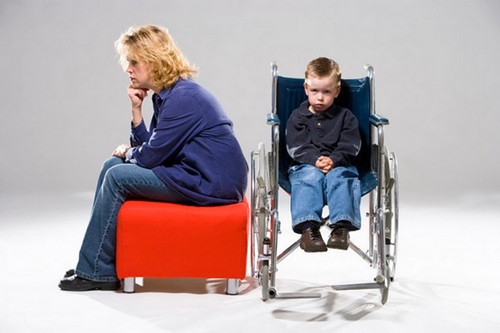
Families with disabled children are at risk
A family raising a child with disabilities is most often forced to solve the following problems:
- Socio-economic problems. To care for a disabled child, one of the parents is often forced to leave their job or hire a person who takes on part of these responsibilities. Both have a negative impact on the family budget. In addition, for such a child to fully grow and develop, expensive medications and special equipment are often needed. Benefits and social benefits in most cases can only partially solve this problem.
- Psychological problems. Despite the fact that the intra-family climate of such families may be quite favorable and prosperous, the risk of divorce in them is much higher. As a result, the child is deprived of a significant part of support and assistance.
- If the child has complex or complex disorders, the absence professional help on the part of specialists often leads to the fact that the child begins to experience a serious lag in intellectual development. the absence or limitation in a child’s interaction with others slows him down social development, provoking psychological immaturity.
Families experiencing abuse. Abuse in the home can affect both children and their family members. In relation to a child, the following may be established:
- Economic violence. Deprivation of a child material goods, conscious refusal to provide the child with the proper level of clothing, food, etc.
- Sexual violence. Forcibly coercing a child into sexual interaction, as well as indecent acts of a sexual nature against him.
- Physical violence. Beating, causing bodily harm to a child that worsens his or her health.
- Psychological abuse. Depriving a child of the proper environment for full development and upbringing. Depriving a child of full contact with an adult.
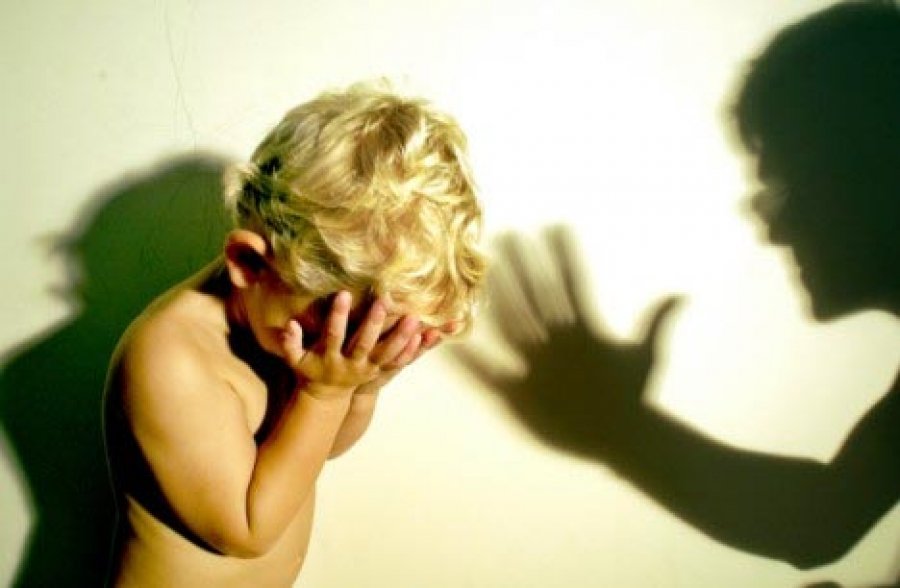
Domestic violence runs in families
Whatever the nature of harsh treatment of a child, its systematic use fundamentally breaks the child’s personality, making him insecure, fearful, and in other cases, overly aggressive and conflict-ridden.
Abuse within the family can also extend to other family members (eg, father's abuse of mother, parent's abuse of grandparents).
Despite the fact that this form of cruelty does not directly affect the child, it cannot but affect his moral and psychological well-being.
In addition, the child in whose presence the family conflicts, runs the risk of engaging in one of the following behavior patterns in the future:
- Become a target of violence yourself. In abusive families, abuse becomes normalized over time. And when creating a family in the future, the child will, without realizing it, implement the behavior patterns practiced in his parental family.
- Become a subject of violence, copying the actions of the aggressive party carrying out the violence.
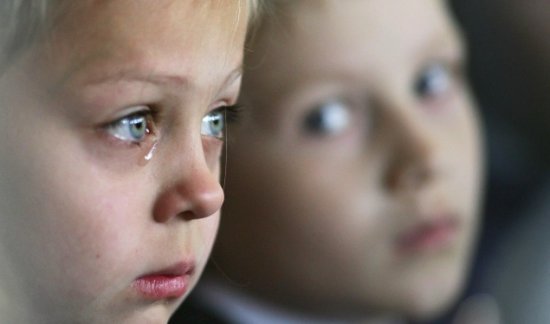
Childhood trauma leaves a mark that lasts a lifetime.
In any of the above cases, correction of abuse is impossible without taking into account not only the most obvious and obvious, but also hidden forms of risk.
Despite the fact that we have given an example of families with the most obvious and pronounced disadvantage, even full families with few children do not escape the difficulties of upbringing.
Many circumstances - for example, the temporary absence of work of one or both parents, delays in wages, the illness of one of the family members - all this can lead to the fact that a family that was prosperous yesterday will need help today. Further fate for this family will largely depend on how timely and high-quality the assistance addressed to them will be. In this way, she can either cope with difficulties or become disadvantaged.
In addition, experts highlight separate category families with hidden disadvantage:
- Families with high level income.
- Families, one or more members of which are famous media persons.
- Families with overly rigid or, on the contrary, blurred family boundaries.
- Families with codependent members.
- Mistrustful families.
- Families focused on the unconditional success of the child.
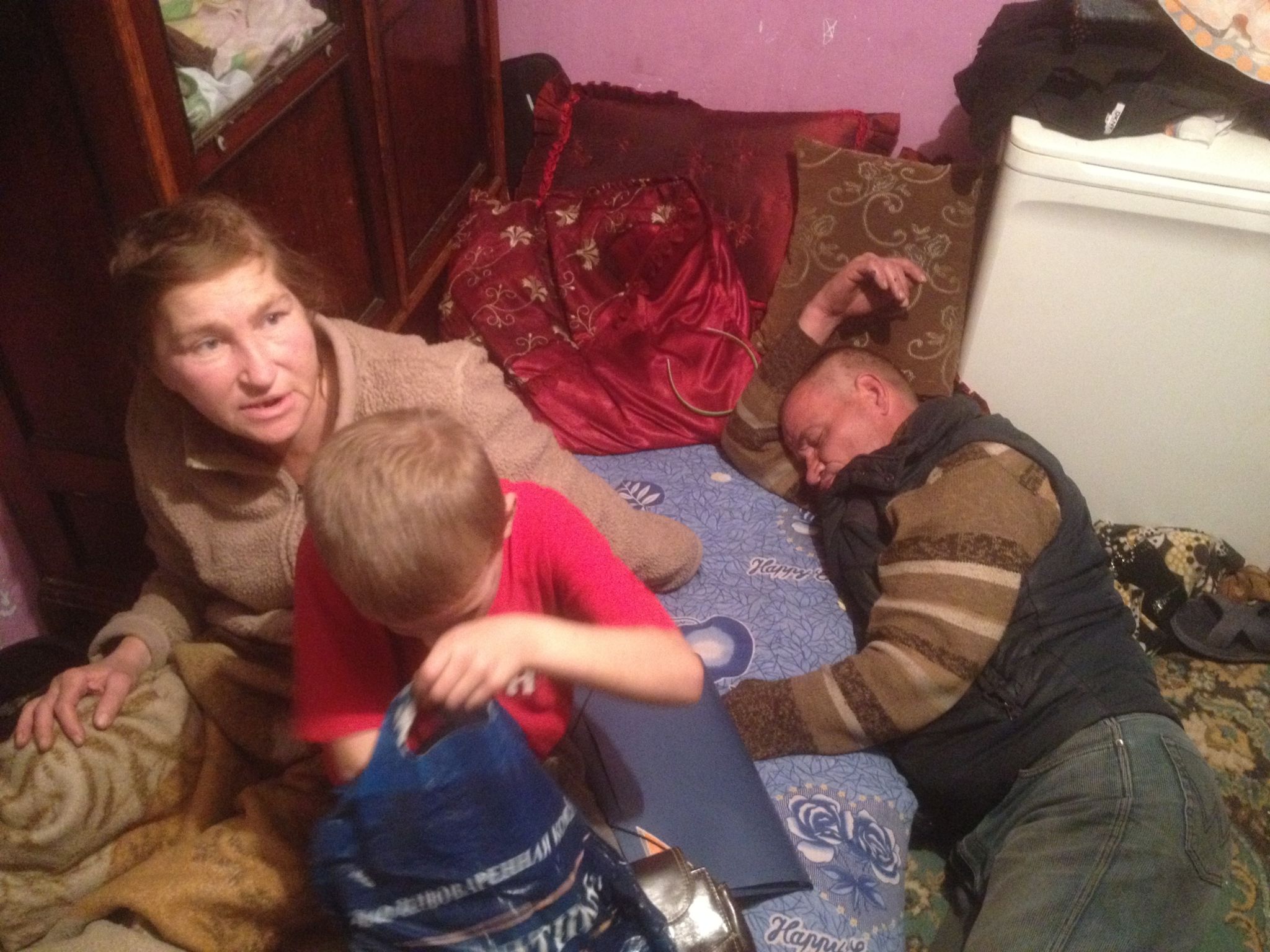
Dysfunctional families should be under constant supervision
A distinctive feature of families with hidden disadvantage is that although their difficulties are not so striking and not so obvious, they have no less negative impact on the development of the child who is being raised in it.
This significantly makes it difficult for the family to recognize the fact of trouble and, as a consequence, to work with it.
Ways to correct social problems of family education
The challenges that social services currently face in addressing family dysfunction are certainly significant. And it is almost impossible to solve them in the shortest possible time. But, despite this, it is possible and necessary to take measures to solve problems of this type.
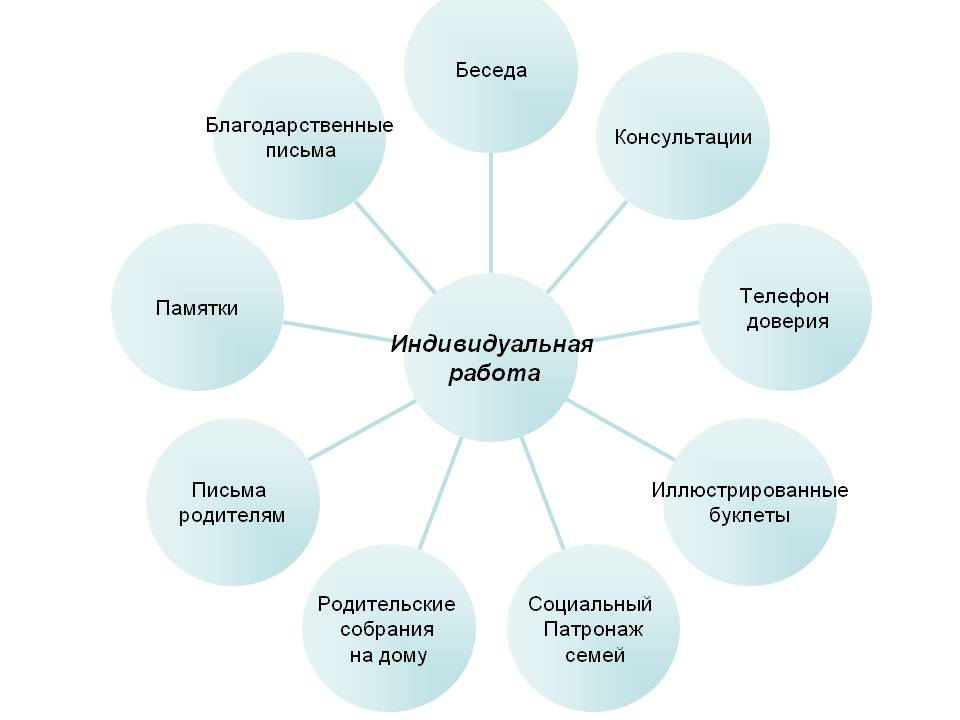
Among possible ways corrections:
- Development of the field of prevention and early diagnosis of child abuse and other forms of family dysfunction
- Expanding the network of helplines, increasing the psychological culture of the population.
- Expanding networks of social rehabilitation centers, as well as assistance and support centers for disadvantaged families and families at risk
- Organizing foster care and foster care courses where candidates for adoption or guardianship could acquire the necessary skills to interact with a foster child
- System of measures to prevent social orphanhood, homelessness and neglect
Working with families at risk certainly requires integrated approach, taking into account all the circumstances in which it finds itself. But no matter how difficult the situation in which the child finds himself may seem, a correctly constructed interaction strategy and faith in him best qualities will allow him to regain the joy of life. And the opportunity to look with a smile into the future, where there is no place for violence and cruelty.
DatsoPic 2.0 2009 by Andrey Datso
Upbringing in a family is the alpha and omega of each person’s development as an individual, the reason for most of our complexes or, on the contrary, our self-confidence, and therefore success in any chosen field.See: What to give your baby for New Year
Raising children in a family - we work without insurance
Problems of family education can become global problems of the society in which we have to live. If we raise our children poorly or even try to shift the care of them onto the shoulders of others, we are building with our own hands a future in which we will be surrounded, perhaps, by successful and business-minded, but indifferent people.
Teachers and educators of our dearly beloved children complain that parents (that is, you and me) have completely ceased to be interested in raising children. How can this be, we are indignant, but we read specialized literature, master the methods of Doman, Montessori, Nikitin and Zaitsev, from an early age we send our children to English, ballroom dancing and the sports section, we invite a speech therapist to our home. The key words here are “give” and “invite,” and this is one of the main problems of family education. We try with all our might to shift the upbringing of our own offspring onto the shoulders of others, completely forgetting that family upbringing lays the foundation of personality. And this is precisely the area where you cannot completely trust specialists; you need to invest your own soul.
Features of the psychology of family education
It is very important for a child to know that his parents love him, and for nothing, regardless of his academic success, behavior or sporting achievements. It seems to us, adults, that parents’ love for their children is self-evident, but they, children, need proof. The kid is trying with all his might to draw attention to himself, if not through good deeds, then through hooliganism or stubborn unwillingness to obey. Parents often do not understand the signals given to them and become convinced that they have made some mistakes in raising them in the family and, again, try to occupy the child with some useful activities, preferably in the presence of a professional teacher.
Every parent should remember that peculiarity of raising children in the family is that feelings and emotions come first. You do not evaluate the child, you love him and accept him for who he is.
Contrary to popular belief, love cannot spoil a child. If you really love your child, you will not indulge his whims and encourage the development of bad inclinations. As a rule, people who cover up a weakness of character with love allow a child to do whatever he wants. If your love is not so strong as to refuse your child something that could harm him, then we can talk about the problems of raising a family.
About family education as the key to a comfortable life in society
Family education allows the child to gain first knowledge about the world in which he will live, an idea of what is good and what is bad, how to act in a given situation. Thanks to upbringing in a family, the baby receives initial skills in communication and interaction in a team, even if this team is limited to three family members. By the way, this is why it is important for a child to have brothers and sisters. Children from large families are more adapted to life in society; such family education can be given the title of “school of life.”
One of the positive features of family education is the child’s communication with representatives of different age categories. He learns to build relationships with people not only of different personalities, but also of different ages. Growing up in a large family prepares a person for life, creating a miniature model of society.
A few simple rules for family education
Each family has its own characteristics, techniques and traditions of family education. It is impossible to give universal advice to everyone, everyone, without taking into account the age and quantitative composition and social level. However, some general rules exist. They are simple and banal, but, like many obvious things, they are sometimes forgotten by us.
– Family education suggests an atmosphere of love, happiness, warmth and goodwill.
– Parents accept the child as he is, try to develop his abilities, all the best that is in him.
– Family education takes into account the characteristics (age, gender, personality) of the child and is built on the basis of these characteristics.
– Raising children in a family is based on mutual respect, from which high demands arise.
– Problems of family education are often rooted not in the child, but in the personality of the parents, whose behavior model the children unknowingly copy.
– Family education is built on the positive that is in a little person. You can't focus solely on the shortcomings. This approach is wrong and leads to the development of complexes.
– In family education, it is enough to simply follow the following principle, which experts in child psychology insist on: any training, any activities aimed at the development of a child should be built in the form of a game.
– The general tone of upbringing in the family should be positive and optimistic.
Negative factors and problems of family education
There are also disadvantages of family upbringing that can play a negative role in a person’s life. So negative peculiarities of family upbringing It is worth paying special attention, since it is they who force some teachers to talk about the advisability of the boarding school system, that is, universal education in isolation from the family. Let's name the most common negative factors in raising children in a family.
– Material factors can be considered the most influential in prosperous families. Family education, both in more affluent families and in families with little income, is often based on cultivating the idea of the predominance of material values over spiritual ones.
– The value of family education falls if parents are not only unspiritual people, but are also determined to aggressively oppose the development of the spiritual principle in the child.
– Two sides of the same coin - impunity and authoritarianism - also do not benefit the upbringing of children in the family. The child develops a false picture of the world, which provokes subsequent inappropriate behavior and the development of hidden complexes.
– It is completely unacceptable to be brought up in a family in an atmosphere of immorality, to instill in a child immoral ideas about people’s behavior.
– A difficult psychological climate in the family is, unfortunately, so widespread that this factor is not even considered necessary to mention. Nevertheless, growing up in dysfunctional families in an atmosphere of scandals, assault, and quarrels between parents has an extremely negative impact on the child and can become a source of subsequent psychological problems.
– Often, upbringing in a seemingly prosperous family does not bring the fruits that it should bring. This happens if parents are confident in their psychological and pedagogical doctrine (usually outdated or erroneous), using psychological pressure and physical punishment in family education, causing children not only physical, but also mental suffering.
Fortunately, today there are psychological services and legal services that a child can turn to if his health, sanity or life is in danger.
However, despite all the pitfalls, the family remains the most important condition for the proper development of children. The trend that has emerged in families cannot but rejoice. Parents, especially young ones, perceive and analyze information about the upbringing and methods of child development, apply the acquired knowledge in practice and try to pay more attention to their children than they themselves received in childhood. Remember that knowledge, ideas about the world, habits established by the family will remain with a person for life and will largely become the determining conditions for his behavior and successful life.
Parent meeting
Report class teacher on the topic of the meeting
"Problems of modern family education."
Children dream of freedom and equality, and most of all they value respect for themselves as individuals. And they suffer from the same things as adults - from addiction, from misunderstanding, from loneliness.
Of course, everyone has the kind of mom and dad, educators, teachers that God sent them. But when we punish, allow or prohibit, praise, give instructions, we must remember: the child has the right to choose, has the right to his own mistakes and lessons, to honesty and respect.
The topic of our meeting today is “The problem of modern family education.”
The family is the main link of members of society created on the basis of mutual desire, who are interconnected by economic relations and who bear moral responsibility for each family member.
Family education is the process of raising children, the process of conscious formation by parents of the spiritual, intellectual, physical, aesthetic, labor skills and qualities of children.
Why is it necessary for parents to realize the importance of family education? According to research by leading modern teachers, psychologists and scientists estimate that 86% of successful parenting depends on the family. And only 14% is education in kindergartens educational institutions, on the street, etc.
What causes such a high percentage?
1) Family upbringing is distinguished by a deeply emotional, intimate nature. The “conductor” of such upbringing is parental love and certain feelings.
Any mother feels her child very subtly; she has experienced various moments of joy, sadness, happiness, and grief with him. No relationship with other people provides such a deep emotional connection with a child.
Fatherhood is a highly moral social quality.
2) Family upbringing is characterized by consistency and long-term educational influence of the mother, father, and other relatives. Ensures positive development nervous system, forms the child’s skills and habits. Differs in unity of requirements.
3) The family has objective opportunities to include the child from the first days of life in a variety of activities (travel to various types transport, visiting various public places - shops, theaters, museums; from one and a half years old it is possible to include a child in labor activity– work assignments).
4) Only family education makes it possible to understand one’s gender and master real role behavior (observe the behavior of father and mother in Everyday life) .
5) Family education provides great potential for the development of a culture of life. Each family has certain traditions - celebrating birthdays, any other holidays, during which the child learns the culture of receiving guests, conducting a conversation at the table, etc.
So, we are talking about the factors that determine the success of family education. But modern life dictates its terms, and many families face big amount problems.
Let's consider main problems of modern family education.
- Lack of a clear strategy for raising children in the family: how parents choose an upbringing strategy (using the example of their parents, opposite the upbringing system of their parents, choosing a system according to pedagogical literature).
Very often one can observe the inability of parents to agree on a system for raising their children. Also relevant is the lack of information about education (literature, video materials), so some parents simply do not know how to raise children.
- Difficult living conditions, changing values and life priorities. The main task that parents set for themselves is to feed and decently dress their child. Not every family can now afford to buy books, educational games, educational computer programs. There is no system of spiritual education - in the pursuit of “pennies” there is not always enough energy and time to think about spirituality and morality.
Essential limiting the influence of the social environment on parents(lack of transfer of experience from the older generation to the younger, lack of transfer of experience through the theater, exhibitions, museums, etc.)
- Immature marriage, lack of motivation to start a family, psychological unpreparedness to have children. Young mothers and fathers who have no education, no experience, no work, little idea why they gave birth to a child and how to care for him. A child is the ability to deny oneself to meet the needs of another.
Based on these problems, children become “hostages” of their parents. Children are assigned a certain role in the family, which shapes the child’s character.
Let's look at the main “roles” using the example of “difficult” families.
"Idol of the family." The child evokes the general admiration of his family, no matter how he behaves. They address him mainly in a touching tone. Any or almost any of his whims are immediately fulfilled by adults, and one of the adults who does not do this causes reproach from the others. The life of the family is, as it were, entirely devoted to the child. At first glance, this looks like a completely understandable love of children. People who have created an idol out of a child will very convincingly prove that they “live for children.” Sometimes this is true, and, nevertheless, it is difficult to approve of such an attitude towards a child. In such an atmosphere, he grows up pampered, capricious, and most importantly, self-centered, because from an early age he gets used to putting his person at the center of the universe. IN in some cases such “boundless” love for a child is not as selfless as it seems; it is possible, for example, that raising him to idols is a reflection of adult rivalry. Each of the adults - mom, dad, etc. - by demonstrating exceptional affection for the child, tries to assert his dominance in the family. At the same time, the magnitude of each person’s “contribution” to caring for the child latently turns out to be a trump card in the “game” of adults.
Another option is possible: the “family idol”, without knowing it, performs the function of a cementing factor that supports the family hearth in conditions of imaginary cooperation of adults. There is no true mutual understanding or readiness for emotional support in the family, but everyone is interested in maintaining the appearance of well-being, and general admiration for the child is turned into a symbol of family “unity.”
"Mom's treasure."In this case, the child is not a universal one, but someone’s personal idol. Imposing such a role on a child can hide many complex psychological reasons(a mother, dissatisfied with her marriage, unconsciously tries to pour out on the child all her inherent passion, tenderness, sacrifice - the same thing happens with the father. The child is put in a difficult position: he perfectly feels the special attitude of one of the adults towards him , but the lack of the same attitude on the part of others is no less acutely perceived. For children, it is painful to be “torn” between several elders, while clearly realizing that they must behave differently with some than with others. The role of someone’s favorite is imposed on the child. , often indicates intense rivalry between adults. The rivalry of adults usually manifests itself in the traditional question to a child: “Who do you love more?” By satisfying their vanity in this way and emphasizing their importance in the eyes of others, adults injure and disorient the child, inevitably fostering hypocrisy in him. and resourcefulness.
"Good girl." Usually everyone is pleased with a well-mannered, obedient, model child, with him there is less hassle and more reasons for parental pride. Meanwhile, behind the attempt of adults to make the child impeccable, an atmosphere of insufficient cooperation in the family is often hidden. People do not know how and do not consider it necessary to emotionally penetrate each other, to share intimate and painful things in the family. It is preferable to pretend that there are no conflicts than to look for ways of reasonable, human resolution. The child is expected, first of all, to maintain decency; he confirms these expectations with his exemplary behavior, and for this he is rewarded by his elders. What is the actual content of the child’s inner life, in essence, no one cares. And constant hypocrisy becomes the norm for a child for the rest of his life.
It is not so rare for a child, who is a model at home, to unexpectedly commit illegal acts, to the sincere bewilderment of his family. Let's add to this that very often, by imposing the role of a good boy on a child, parents subconsciously stroke their pride and oblige the child to maintain family prestige. At the same time, the child develops and is cultivated by his parents inflated claims to himself and the fear of inconsistency of his achievements with these claims. If at first every mistake in a child’s behavior is pointed out to him by his parents, then later he blames himself for any, even the slightest, failure in life. In childhood, he, one might say, lets down the whole family: as an adult, he sees in the failure to confirm his expectations his inferiority, his failure, which makes him vulnerable to difficulties, criticism, and inevitable mistakes. He continues to look at himself not from the position of an independent person, but through the demanding eyes of his parents... thus, a child who is “too good” is not always evidence of proper upbringing.
A special case is the role of the “sick child.” Of course, there are quite a few children whose health requires special attention and care. However, in life one can also observe the following picture: a child who has been ill for a long time practically recovers and would like to feel equal to all other children, but someone in the family stubbornly continues to treat him as sick, weak and demand that others treat him the same way. This is where the conditional “benefit” of a child’s illness for one of the family members is revealed. Either it is intended to serve again as a trump card in someone’s game, or as a means of someone’s self-affirmation.
In other cases, adults are unable, and perhaps do not want, to break the existing stereotype of their relationship with the child. It is much easier to treat him like a patient, continuing to fuss around him as usual, than to look for new ones. full forms spiritual contact. In addition, the mission of the guardian extends parental authority over the growing child. We see that imposing the role of the sick on a child may turn out to be nothing more than a form of imaginary cooperation with him, that is, a substitute for genuine cooperation.
Another anomalous role is the role of "Cinderella" when a child is openly turned into a servant in the house, and all the best, including rewards, belongs to other children or adults in the family. A child forced to play this role grows up humiliated, insecure, envious and not independent. But this is an extreme example of how adults selfishly use a child in a function beneficial to them.
In all the cases considered, we see that the child is perceived by adults as a means to achieve their personal goal (self-affirmation, removal of responsibility for upbringing) or as an unwillingness to take on the task of upbringing at all. In all the cases considered, children develop negative character traits: effeminacy, capriciousness, distortion of ideas about people of the opposite sex, inflated claims to themselves or a feeling of inferiority. In these examples, we see mistakes in the upbringing of adults, which are made subconsciously, while reasoning like this: “Look, I was beaten and scolded as a child, and nothing - I grew up, became a man! “And people can’t always say that he could have been made a better person in a different way.
In an ordinary healthy family with normal psychological climate The child is not assigned any fixed roles. They love him - he feels like the “idol of the family”, he did a prank, he is perceived as a terrible child, he is punished. Trying to regain his favor, he becomes a good boy, and sometimes a cunning one. He is either his mother’s treasure or his father’s, but all this is fleeting, since no one obliges him to this, even subconsciously. But here are the roles that never happen in a normal family: “Cinderella”, “downtrodden”. What role is assigned to a child in a normal family? This is an assistant, an equal participant, interesting person, advisor. With this style of upbringing, the child develops the most important qualities: community with family, personal responsibility to others, pride in participating in the life of his family.
How to achieve positive results and avoid mistakes in raising children?The formation of relationships in the family in general and the character of the child in particular are influenced by attitudes - that is, the most frequently spoken words and phrases addressed to one of the family members. Positive attitudes carry a positive attitude and high emotionality. Negative attitudes depress, lower self-esteem, and humiliate.
Let's look at the most common negative expressions addressed to children. (Appendix No. 1)
Now let's look at the positive attitudes. (Appendix No. 2)
How can each of you specifically change your settings?
Instructions.
Step 1. Ask relatives to follow you for a certain time (one day, two, three) and write down the expressions you use most often.
Step 2. Analyze and remove negative expressions from communication.
Step 3: Replace them with positive cues.
Advice from a psychologist: “Resolving a conflict situation”
1. Take a deep breath - exhale.
2. Count to 10 in at a relaxed pace. This way the first wave of anger and irritation will fade away.
3. Think about whether everything is really so scary, irreparable and threatening the life and health of the child.
4. Take action to resolve the situation.
Feelings of guilt and shame will in no way help a child become happy and healthy. You shouldn’t make his life dull, sometimes a child doesn’t need an assessment of his behavior and actions at all, he just needs to be reassured. Much in the process of raising children depends not only on the experience and knowledge of parents, but also on their ability to feel and guess.
So take a guess! Help children become active, energetic, resilient!
GOOD LUCK TO YOU!








